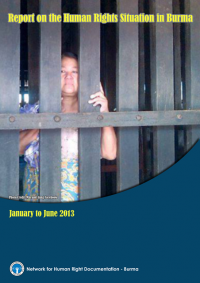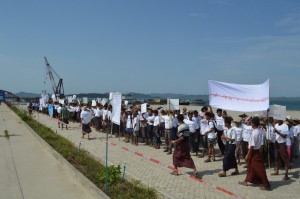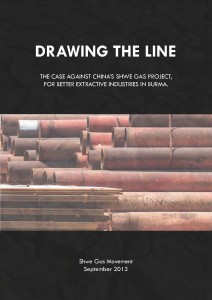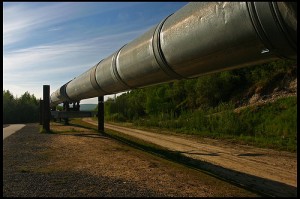Posts Tagged ‘Human Rights Violations’ (349 found)
Report on the Human Rights Situation in Burma (January 2013 – June 2013)
 Over the six months from January to June 2013, ND-Burma documented 147 human rights violations across Burma. These violations occurred in areas of armed conflict but also in areas covered by ceasefires. Each violation is a specific incident, but it may involve any number of victims, from one victim of killing, to forced labor involving many victims, to the forced displacement of an entire village. ND-Burma’s findings demonstrate that, despite progress in reaching ceasefire agreements with non-state armed groups, the government has made little progress protecting the human rights of its citizens. Furthermore, continued arrests of human rights defenders demonstrate that the government is not serious about working with civil society to protect human rights […]
Over the six months from January to June 2013, ND-Burma documented 147 human rights violations across Burma. These violations occurred in areas of armed conflict but also in areas covered by ceasefires. Each violation is a specific incident, but it may involve any number of victims, from one victim of killing, to forced labor involving many victims, to the forced displacement of an entire village. ND-Burma’s findings demonstrate that, despite progress in reaching ceasefire agreements with non-state armed groups, the government has made little progress protecting the human rights of its citizens. Furthermore, continued arrests of human rights defenders demonstrate that the government is not serious about working with civil society to protect human rights […]
ND-Burma Report Documents On-Going Human Rights Abuse in Burma
The Network for Human Rights Documentation – Burma (ND-Burma) has released a periodic report documenting the human rights situation in Burma during the period of January – June 2013. The report documents 147 cases of human rights violations committed by the government and military throughout Burma […]
• • •A Dangerous Precedent for Development in Burma
 On 30 September, Shwe Gas Movement released a new report entitled, “Drawing The Line: The Case Against China’s Shwe Gas Project, For better Extractive Industries in Burma”. The report highlights the consequences, violations, unequal development, inadequate laws and the dangerous precedent set by the Shwe Gas Project. With increased investment and the liberalization of Burma’s economy, development projects similar to Shwe Gas are set to increase. If they follow a path of code and conduct similar to the Shwe Gas Project, the future of Burma will be rife with increased land confiscation, labor abuse, environmental degradation, loss of livelihoods, conflict, arrests and imprisonment of rights activists defending themselves and their communities. The benefits will be unequally distributed and negative consequences will be borne by farmers, fishermen, and by the citizens of Burma.
On 30 September, Shwe Gas Movement released a new report entitled, “Drawing The Line: The Case Against China’s Shwe Gas Project, For better Extractive Industries in Burma”. The report highlights the consequences, violations, unequal development, inadequate laws and the dangerous precedent set by the Shwe Gas Project. With increased investment and the liberalization of Burma’s economy, development projects similar to Shwe Gas are set to increase. If they follow a path of code and conduct similar to the Shwe Gas Project, the future of Burma will be rife with increased land confiscation, labor abuse, environmental degradation, loss of livelihoods, conflict, arrests and imprisonment of rights activists defending themselves and their communities. The benefits will be unequally distributed and negative consequences will be borne by farmers, fishermen, and by the citizens of Burma.
The Shwe Gas Project is the largest extractive resource project in Burma with dual gas and oil pipelines traveling almost 800km beginning in Arakan State, passing through Magway and Mandalay Regions, exiting Burma through northern Shan State and terminating in Kunming, China. The now operational project provides China with a valuable energy transportation system and is expected to earn US$54 billion for the Burma government, a government that was given the lowest resource governance ranking in the world three months ago by the Revenue Watch Institute […]
New Report: Shwe Gas Project Sets Dangerous Precedent
A new report released by Shwe Gas Movement calls for suspension of the Shwe Gas Project on the grounds that it sets a dangerous precedent for the extractive industries and leads to ongoing human rights abuses that include land confiscation, poor labor practices, environmental damage and exacerbation of tensions with ethnic nationalities […]
• • •Drawing The Line: The Case Against China’s Shwe Gas Project, For Better Extractive Industries in Burma
 The Shwe Gas project, the largest extractive project in Burma, set to earn US$54 billion for the Burmese government, has just begun transferring Burma’s natural gas to China. As the first such project to become operational under the new quasi-civilian government, its management will set the precedent for how future extractive projects will be carried out as Burma opens up for investment and resource bidding. As it stands, the standard is not good […]
The Shwe Gas project, the largest extractive project in Burma, set to earn US$54 billion for the Burmese government, has just begun transferring Burma’s natural gas to China. As the first such project to become operational under the new quasi-civilian government, its management will set the precedent for how future extractive projects will be carried out as Burma opens up for investment and resource bidding. As it stands, the standard is not good […]
Myanmar National Human Rights Commission Issues News Release on Complaints
1. The Myanmar National Human Rights Commission was constituted with the aim of raising and protecting the fundamental rights of citizens in accord with the Constitution of the Republic of the Union of Myanmar and its office is kept open at No. 27 on Pyay Road in Hline Township of Yangon […]
• • •New Film Calls for Political Dialogue for Lasting Peace in Burma’s Kachin State
To coincide with the International Day of Peace, Burma Partnership launched a new documentary film today entitled, “Guns, Briefcases and Inequality: The Neglected War in Kachin State.” The film demonstrates the need for the government of Burma to engage in meaningful political dialogue with all ethnic nationalities on equal terms, including discussing amendments to the 2008 Constitution. These are necessary in order to address the underlying causes of armed conflict: self-determination, the lack of ethnic rights, and inequality, and to move towards lasting peace throughout the country […]
• • •Whose Guns Are Silent?: An Analysis of Burma’s Fractured Peace Process
This paper is an analysis of the current situation with recommendations to the parties concerned. It is based on interviews with representatives of ethnic non-state armed groups (NSAGs), community-based organizations and civil society groups. On a state visit to the United Kingdom in July, President Thein Sein stated, “Very possibly, over the coming weeks, we will have a nationwide ceasefire and the guns will go silent everywhere in Myanmar for the first time in more than 60 years.” There is a significant gap in the pronouncements of the Thein Sein government and the realities of the ground situation in Burma’s ethnic areas: this paper seeks to explain that gap […]
• • •Shwe Gas Pipeline, A Sign of Things to Come
 On 28 July, Burma’s Ministers of Energy, the Vice President, the Ambassador of China and a representative from South Korea started the Shwe Oil and Gas Pipeline. It was reported that when the “torches flamed in the sky of Namkham Measuring Station of [Burma]-China Gas Pipeline, a storm of applause and cheers broke out on the ceremony site and Namkham Metering Station.” This image is disturbing: representatives from China, international business and the government of Burma cheered the flames, but no such excitement was felt among the local communities or representatives from social or environmental groups in ethnic areas.
On 28 July, Burma’s Ministers of Energy, the Vice President, the Ambassador of China and a representative from South Korea started the Shwe Oil and Gas Pipeline. It was reported that when the “torches flamed in the sky of Namkham Measuring Station of [Burma]-China Gas Pipeline, a storm of applause and cheers broke out on the ceremony site and Namkham Metering Station.” This image is disturbing: representatives from China, international business and the government of Burma cheered the flames, but no such excitement was felt among the local communities or representatives from social or environmental groups in ethnic areas.
The dual pipelines will travel almost 800km, beginning in Arakan State, passing through Magway and Mandalay Regions and exiting Burma through Northern Shan State. They will cross through various ethnic nationality areas as well as diverse ecosystems, from jungles to mountain ranges.
The pipelines will also traverse ongoing ethnic conflict areas. As recently as April, an international security consultant advised against opening the pipeline due to its path through conflict areas, and warned of the potential for catastrophe […]
• • •Myanmar: UN Expert Greets Abolition of Notorious Border Security Force in Rakhine State and Calls for Accountability
The United Nations Special Rapporteur on the human rights situation in Myanmar, Tomás Ojea Quintana, today welcomed the abolition of Nasaka, the notorious border security force operating in Rakhine State. He urged the authorities to investigate and hold accountable those members of the force responsible for human rights abuses […]
• • •








 All posts
All posts